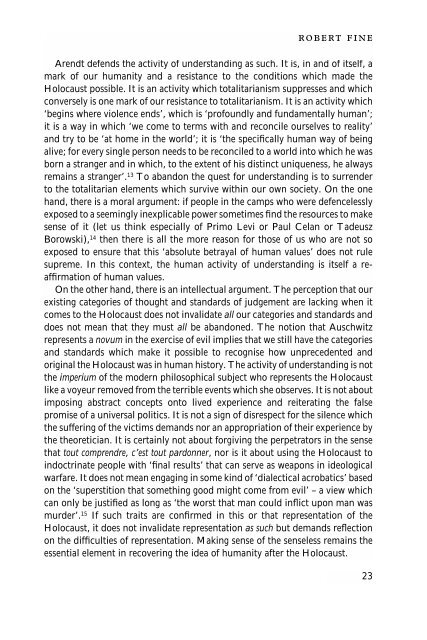You also want an ePaper? Increase the reach of your titles
YUMPU automatically turns print PDFs into web optimized ePapers that Google loves.
obert fine<br />
Arendt defends <strong>the</strong> activity of understanding as such. It is, in and of itself, a<br />
mark of our humanity and a resistance to <strong>the</strong> conditions which made <strong>the</strong><br />
<strong>Holocaust</strong> possible. It is an activity which totalitarianism suppresses and which<br />
conversely is one mark of our resistance to totalitarianism. It is an activity which<br />
‘begins where violence ends’, which is ‘profoundly and fundamentally human’;<br />
it is a way in which ‘we come to terms with and reconcile ourselves to reality’<br />
and try to be ‘at home in <strong>the</strong> world’; it is ‘<strong>the</strong> specifically human way of being<br />
alive; for every single person needs to be reconciled to a world into which he was<br />
born a stranger and in which, to <strong>the</strong> extent of his distinct uniqueness, he always<br />
remains a stranger’. 13 To abandon <strong>the</strong> quest for understanding is to surrender<br />
to <strong>the</strong> totalitarian elements which survive within our own society. On <strong>the</strong> one<br />
hand, <strong>the</strong>re is a moral argument: if people in <strong>the</strong> camps who were defencelessly<br />
exposed to a seemingly inexplicable power sometimes find <strong>the</strong> resources to make<br />
sense of it (let us think especially of Primo Levi or Paul Celan or Tadeusz<br />
Borowski), 14 <strong>the</strong>n <strong>the</strong>re is all <strong>the</strong> more reason for those of us who are not so<br />
exposed to ensure that this ‘absolute betrayal of human values’ does not rule<br />
supreme. In this context, <strong>the</strong> human activity of understanding is itself a reaffirmation<br />
of human values.<br />
On <strong>the</strong> o<strong>the</strong>r hand, <strong>the</strong>re is an intellectual argument. The perception that our<br />
existing categories of thought and standards of judgement are lacking when it<br />
comes to <strong>the</strong> <strong>Holocaust</strong> does not invalidate all our categories and standards and<br />
does not mean that <strong>the</strong>y must all be abandoned. The notion that Auschwitz<br />
represents a novum in <strong>the</strong> exercise of evil implies that we still have <strong>the</strong> categories<br />
and standards which make it possible to recognise how unprecedented and<br />
original <strong>the</strong> <strong>Holocaust</strong> was in human history. The activity of understanding is not<br />
<strong>the</strong> imperium of <strong>the</strong> modern philosophical subject who represents <strong>the</strong> <strong>Holocaust</strong><br />
like a voyeur removed from <strong>the</strong> terrible events which she observes. It is not about<br />
imposing abstract concepts onto lived experience and reiterating <strong>the</strong> false<br />
promise of a universal politics. It is not a sign of disrespect for <strong>the</strong> silence which<br />
<strong>the</strong> suffering of <strong>the</strong> victims demands nor an appropriation of <strong>the</strong>ir experience by<br />
<strong>the</strong> <strong>the</strong>oretician. It is certainly not about forgiving <strong>the</strong> perpetrators in <strong>the</strong> sense<br />
that tout comprendre, c’est tout pardonner, nor is it about using <strong>the</strong> <strong>Holocaust</strong> to<br />
indoctrinate people with ‘final results’ that can serve as weapons in ideological<br />
warfare. It does not mean engaging in some kind of ‘dialectical acrobatics’ based<br />
on <strong>the</strong> ‘superstition that something good might come from evil’ – a view which<br />
can only be justified as long as ‘<strong>the</strong> worst that man could inflict upon man was<br />
murder’. 15 If such traits are confirmed in this or that representation of <strong>the</strong><br />
<strong>Holocaust</strong>, it does not invalidate representation as such but demands reflection<br />
on <strong>the</strong> difficulties of representation. Making sense of <strong>the</strong> senseless remains <strong>the</strong><br />
essential element in recovering <strong>the</strong> idea of humanity after <strong>the</strong> <strong>Holocaust</strong>.<br />
23

















